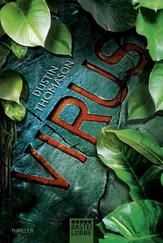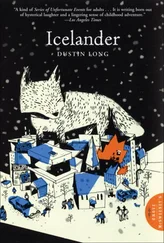“Sure…”
“Every subject exists in relation to an object,” Victor said. “Every date in relation to a god, every king to his polity. We always talk of King K’awiil of Tikal, not simply of King K’awiil. We talk of a ballplayer and his ball as one. Of a man and his spirit animal. Neither word exists without the other. They mean one thing.”
“One idea,” Chel said, “not two.”
Victor started to pace around the lab. “Right. So what if these glyphs work the same way? What if the scribe doesn’t refer to a father and his son but to a single man with the properties of both?”
It dawned on Chel what he was saying. “You think the scribe’s referring to himself as having the spirit of his father inside him?”
“We use it in English to talk about how similar we are to our parents. You are your mother’s child. Or, in your case, your father ’s child, I suppose. He’s referring to himself.”
“It means I ,” she said, astonished.
“I’ve never seen it used this exact way,” Victor continued, “but I have seen grammatical constructions like this used to highlight a noble’s connection to a god.”
Chel felt like she was floating. All the other codices were written in the third person—the narrator a distant, detached player in the story he was describing.
This was completely different.
“I am not noble by birth,” Victor read, “and so there is much I do not fathom about the ways of the gods that watch over us, there is much I do not hear that the gods would whisper in the ears of a king.”
A fi rst-person narrative would be unique in the history of the discipline. There was no telling what could be learned from such an account. It could bridge a thousand-year gap and truly connect Chel’s people to the inner lives of their ancestors.
“Well,” Victor said, drawing a pen from his pocket as if it were a weapon. “I think it’s time to find out if this thing is worth all the trouble it’s caused.”

No rain has come to give us nourishment in a half cycle of the great star. The fields of Kanuataba have been harvested and humiliated, and the deer and birds and jaguar guardians of the land have been pushed out. Hillsides have been ruined, insects swarm, and our soils are no longer fed by falling leaves. The animals and butterflies and plants given to us by the Holy Bearer have nowhere to go to continue their spirit lives. The animals bear no flesh for cooking.
I am not noble by birth, and so there is much I do not fathom about the ways of the gods that watch over us, there is much I do not hear that the gods would whisper in the ears of a king. But I do know Kanuataba was once home to the most majestic collection of ceiba trees, the great path to the underworld, in all of the highlands. The ceiba once grew denser than anywhere in the world, blessed by the gods, their trunks nearly touching. Now there are fewer than a dozen still standing in all of Kanuataba! Our holy lake has dried to nothing but dirt. The water made to shoot from stone shoots from the palace and temples no more. In the plazas, untouchables beg us to buy their useless, cracked pots and rotting vegetables, diluted spices for meats that only the nobles can afford. There are no agouti, kinkajou, deer, or tapir to season. The children of Kanuataba become hungrier with each change of the sun’s mighty journey across the sky.
Forgive me then, monkey scribe, whose ring I wear on my hand as the symbol of scribes past! Here in Kanuataba, I commence my record on the virgin bark paper I stole from the king. I have done little worth recording in the books of Kanuataba. I am the tutor to the king’s son, and I have painted forty-two books in the service of the court. But now I paint for the people, and the children of our children’s children, an honest account of what came in the time of King Jaguar Imix!
Two suns ago, following a night when the quarter moon hung low in the sky, twelve of the thirteen members of King Jaguar Imix’s royal council were convened. Jacomo, the royal dwarf, who is as lustful as he is small, was also present. I know dwarfs in the fields who love Kanuataba as much as any man of normal size. But this royal dwarf is something else, something terrible. Jacomo is a glutton, and I watched him chewing on the bark of a great tree and spitting vile liquid from his mouth back into the bowl in his lap. Lately I have seen him seduce women by promising crumbs from his beard, forcing them to pleasure him so that they may feed their hungry babes.
Of the thirteen council members, my friend Auxila, royal overseer of the stores and of zoology and agriculture, was the sole man not in attendance. Five suns ago, at our last meeting, Auxila angered the king, and it seemed most likely he was doing penance. Auxila is a good man, and as trade adviser to the king, he knows much of royal accounting, a burden I would never desire. To count a king’s purse is to know the limits of his power.
Galam, bearer of King Jaguar Imix’s decrees and daykeeper for ten turns of the Calendar Round, called the council to begin:
—By the word of Jaguar Imix, by the holy word, we commence this meeting in honor of the new sacred god, so named Akabalam. Akabalam is most powerful. Jaguar Imix decrees that we shall worship Akabalam forevermore.—
I am tutor to Prince Smoke Song, next ruler of Kanuataba, and I have memorized all the great books. Nowhere does a god named Akabalam appear in any of them. I asked the daykeeper:
—What form does the god Akabalam take?—
—When Jaguar Imix sees fit to explain more, Paktul, I will share it with the council. I cannot pretend to understand what his holiness knows about the world.—
Without explanation, then, we prayed and burned incense to this new god. I resolved to study the great books of Kanuataba and find the deity Akabalam on my own. To understand what god had revealed itself to his holiness, the king.
Galam the daykeeper spoke:
—I hereby declare the king’s intention to begin construction of a great new pyramid in the style of the lost civilization of Teotihuacan, which will someday be the place of his interment. The foundation will be laid in twenty days, less than a thousand paces from the palace. The viewing tower shall be built to face the highest point of the procession of the sun and will create a great holy triangle with the palace and the twin pyramid of red.—
My brothers each clapped twice to signify the glory of Jaguar Imix. But when my turn came to clap twice, I asked of Galam, holy messenger, whether the construction of a pyramid was most prudent when there has been no rain:
—The people of Kanuataba have nothing with which to nourish themselves, and even the mandatory laborers will starve as they carry the stones to the top. A temple in the plaza will require plaster that can-not be made without the burning of our most precious trees and plants to dehydrate the rock. Our flora diminishes by the day. The lake has dried up to nothing, and our reservoirs are dwindling.—
Then Jacomo the wanton dwarf spoke to me with anger:
—Be it understood, Paktul, that King Jaguar Imix has received a prophecy from the god Akabalam telling us to launch a star war, timed to the evening star, against distant kingdoms. We will bring back slaves and all their valuables. Our army has a new way to preserve food, salting its supplies more heavily than before, so that we may launch wars on lands even more distant. These cities are weakened by the great drought, and they cannot defend themselves against our mighty army. So now you understand why you dare not question the king!—
Читать дальше













